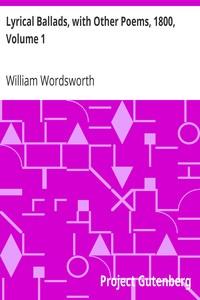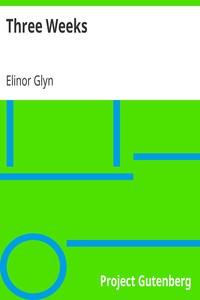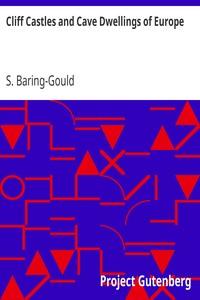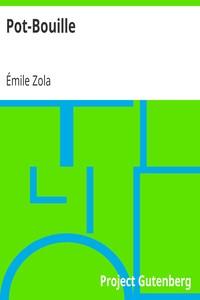Read this ebook for free! No credit card needed, absolutely nothing to pay.
Words: 36397 in 14 pages
This is an ebook sharing website. You can read the uploaded ebooks for free here. No credit cards needed, nothing to pay. If you want to own a digital copy of the ebook, or want to read offline with your favorite ebook-reader, then you can choose to buy and download the ebook.


: Lyrical Ballads with Other Poems 1800 Volume 1 by Wordsworth William - English poetry 19th century
Expostulation and Reply The Tables turned; an Evening Scene, on the same subject Animal Tranquillity and Decay, a Sketch The Complaint of a forsaken Indian Woman The Last of the Flock Lines left upon a Seat in a Yew-tree which stands near the Lake of Esthwaite The Foster-Mother's Tale Goody Blake and Harry Gill The Thorn We are Seven Anecdote for Fathers Lines written at a small distance from my House and sent me by my little Boy to the Person to whom they are addressed The Female Vagrant The Dungeon Simon Lee, the old Huntsman Lines written in early Spring The Nightingale, written in April, 1798. Lines written when sailing in a Boat at Evening Lines written near Richmond, upon the Thames The Idiot Boy Love The Mad Mother The Ancient Mariner Lines written above Tintern Abbey
PREFACE
The First Volume of these Poems has already been submitted to general perusal. It was published, as an experiment which, I hoped, might be of some use to ascertain, how far, by fitting to metrical arrangement a selection of the real language of men in a state of vivid sensation, that sort of pleasure and that quantity of pleasure may be imparted, which a Poet may rationally endeavour to impart.
I had formed no very inaccurate estimate of the probable effect of those Poems: I flattered myself that they who should be pleased with them would read them with more than common pleasure: and on the other hand I was well aware that by those who should dislike them they would be read with more than common dislike. The result has differed from my expectation in this only, that I have pleased a greater number, than I ventured to hope I should please.
For the sake of variety and from a consciousness of my own weakness I was induced to request the assistance of a Friend, who furnished me with the Poems of the ANCIENT MARINER, the FOSTER-MOTHER'S TALE, the NIGHTINGALE, the DUNGEON, and the Poem entitled LOVE. I should not, however, have requested this assistance, had I not believed that the poems of my Friend would in a great measure have the same tendency as my own, and that, though there would be found a difference, there would be found no discordance in the colours of our style; as our opinions on the subject of poetry do almost entirely coincide.
It is supposed, that by the act of writing in verse an Author makes a formal engagement that he will gratify certain known habits of association, that he not only thus apprizes the Reader that certain classes of ideas and expressions will be found in his book, but that others will be carefully excluded. This exponent or symbol held forth by metrical language must in different aeras of literature have excited very different expectations: for example, in the age of Catullus Terence and Lucretius, and that of Statius or Claudian, and in our own country, in the age of Shakespeare and Beaumont and Fletcher, and that of Donne and Cowley, or Dryden, or Pope. I will not take upon me to determine the exact import of the promise which by the act of writing in verse an Author in the present day makes to his Reader; but I am certain it will appear to many persons that I have not fulfilled the terms of an engagement thus voluntarily contracted. I hope therefore the Reader will not censure me, if I attempt to state what I have proposed to myself to perform, and also, to explain some of the chief reasons which have determined me in the choice of my purpose: that at least he may be spared any unpleasant feeling of disappointment, and that I myself may be protected from the most dishonorable accusation which can be brought against an Author, namely, that of an indolence which prevents him from endeavouring to ascertain what is his duty, or, when his duty is ascertained prevents him from performing it.
The principal object then which I proposed to myself in these Poems was to make the incidents of common life interesting by tracing in them, truly though not ostentatiously, the primary laws of our nature: chiefly as far as regards the manner in which we associate ideas in a state of excitement. Low and rustic life was generally chosen because in that situation the essential passions of the heart find a better soil in which they can attain their maturity, are less under restraint, and speak a plainer and more emphatic language; because in that situation our elementary feelings exist in a state of greater simplicity and consequently may be more accurately contemplated and more forcibly communicated; because the manners of rural life germinate from those elementary feelings; and from the necessary character of rural occupations are more easily comprehended; and are more durable; and lastly, because in that situation the passions of men are incorporated with the beautiful and permanent forms of nature. The language too of these men is adopted because such men hourly communicate with the best objects from which the best part of language is originally derived; and because, from their rank in society and the sameness and narrow circle of their intercourse, being less under the action of social vanity they convey their feelings and notions in simple and unelaborated expressions. Accordingly such a language arising out of repeated experience and regular feelings is a more permanent and a far more philosophical language than that which is frequently substituted for it by Poets, who think that they are conferring honour upon themselves and their art in proportion as they separate themselves from the sympathies of men, and indulge in arbitrary and capricious habits of expression in order to furnish food for fickle tastes and fickle appetites of their own creation.
I have said that each of these poems has a purpose. I have also informed my Reader what this purpose will be found principally to be: namely to illustrate the manner in which our feelings and ideas are associated in a state of excitement. But speaking in less general language, it is to follow the fluxes and refluxes of the mind when agitated by the great and simple affections of our nature. This object I have endeavoured in these short essays to attain by various means; by tracing the maternal passion through many of its more subtle windings, as in the poems of the IDIOT BOY and the MAD MOTHER; by accompanying the last struggles of a human being at the approach of death, cleaving in solitude to life and society, as in the Poem of the FORSAKEN INDIAN; by shewing, as in the Stanzas entitled WE ARE SEVEN, the perplexity and obscurity which in childhood attend our notion of death, or rather our utter inability to admit that notion; or by displaying the strength of fraternal, or to speak more philosophically, of moral attachment when early associated with the great and beautiful objects of nature, as in THE BROTHERS; or, as in the Incident of SIMON LEE, by placing my Reader in the way of receiving from ordinary moral sensations another and more salutary impression than we are accustomed to receive from them. It has also been part of my general purpose to attempt to sketch characters under the influence of less impassioned feelings, as in the OLD MAN TRAVELLING, THE TWO THIEVES, &c. characters of which the elements are simple, belonging rather to nature than to manners, such as exist now and will probably always exist, and which from their constitution may be distinctly and profitably contemplated. I will not abuse the indulgence of my Reader by dwelling longer upon this subject; but it is proper that I should mention one other circumstance which distinguishes these Poems from the popular Poetry of the day; it is this, that the feeling therein developed gives importance to the action and situation and not the action and situation to the feeling. My meaning will be rendered perfectly intelligible by referring my Reader to the Poems entitled POOR SUSAN and the CHILDLESS FATHER, particularly to the last Stanza of the latter Poem.
I will not suffer a sense of false modesty to prevent me from asserting, that I point my Reader's attention to this mark of distinction far less for the sake of these particular Poems than from the general importance of the subject. The subject is indeed important! For the human mind is capable of excitement without the application of gross and violent stimulants; and he must have a very faint perception of its beauty and dignity who does not know this, and who does not further know that one being is elevated above another in proportion as he possesses this capability. It has therefore appeared to me that to endeavour to produce or enlarge this capability is one of the best services in which, at any period, a Writer can be engaged; but this service, excellent at all times, is especially so at the present day. For a multitude of causes unknown to former times are now acting with a combined force to blunt the discriminating powers of the mind, and unfitting it for all voluntary exertion to reduce it to a state of almost savage torpor. The most effective of these causes are the great national events which are daily taking place, and the encreasing accumulation of men in cities, where the uniformity of their occupations produces a craving for extraordinary incident which the rapid communication of intelligence hourly gratifies. To this tendency of life and manners the literature and theatrical exhibitions of the country have conformed themselves. The invaluable works of our elder writers, I had almost said the works of Shakespeare and Milton, are driven into neglect by frantic novels, sickly and stupid German Tragedies, and deluges of idle and extravagant stories in verse.--When I think upon this degrading thirst after outrageous stimulation I am almost ashamed to have spoken of the feeble effort with which I have endeavoured to counteract it; and reflecting upon the magnitude of the general evil, I should be oppressed with no dishonorable melancholy, had I not a deep impression of certain inherent and indestructible qualities of the human mind, and likewise of certain powers in the great and permanent objects that act upon it which are equally inherent and indestructible; and did I not further add to this impression a belief that the time is approaching when the evil will be systematically opposed by men of greater powers and with far more distinguished success.
If in a Poem there should be found a series of lines, or even a single line, in which the language, though naturally arranged and according to the strict laws of metre, does not differ from that of prose, there is a numerous class of critics who, when they stumble upon these prosaisms as they call them, imagine that they have made a notable discovery, and exult over the Poet as over a man ignorant of his own profession. Now these men would establish a canon of criticism which the Reader will conclude he must utterly reject if he wishes to be pleased with these volumes. And it would be a most easy task to prove to him that not only the language of a large portion of every good poem, even of the most elevated character, must necessarily, except with reference to the metre, in no respect differ from that of good prose, but likewise that some of the most interesting parts of the best poems will be found to be strictly the language of prose when prose is well written. The truth of this assertion might be demonstrated by innumerable passages from almost all the poetical writings, even of Milton himself. I have not space for much quotation; but, to illustrate the subject in a general manner, I will here adduce a short composition of Gray, who was at the head of those who by their reasonings have attempted to widen the space of separation betwixt Prose and Metrical composition, and was more than any other man curiously elaborate in the structure of his own poetic diction.
It will easily be perceived that the only part of this Sonnet which is of any value is the lines printed in Italics: it is equally obvious that except in the rhyme, and in the use of the single word "fruitless" for fruitlessly, which is so far a defect, the language of these lines does in no respect differ from that of prose.
Is there then, it will be asked, no essential difference between the language of prose and metrical composition? I answer that there neither is nor can be any essential difference. We are fond of tracing the resemblance between Poetry and Painting, and, accordingly, we call them Sisters: but where shall we find bonds of connection sufficiently strict to typify the affinity betwixt metrical and prose composition? They both speak by and to the same organs; the bodies in which both of them are clothed may be said to be of the same substance, their affections are kindred and almost identical, not necessarily differing even in degree; Poetry sheds no tears "such as Angels weep," but natural and human tears; she can boast of no celestial Ichor that distinguishes her vital juices from those of prose; the same human blood circulates through the veins of them both.
Free books android app tbrJar TBR JAR Read Free books online gutenberg
More posts by @FreeBooks


: Cliff Castles and Cave Dwellings of Europe by Baring Gould S Sabine - Cliff-dwellings Europe; Cave dwellings Europe; Troglodytes


: Pot-Bouille by Zola Mile - Paris (France) Fiction; France History Second Empire 1852-1870 Fiction FR Littérature





